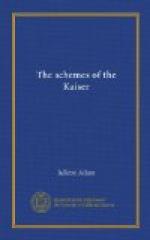So that we may recognise each other in this world’s wilderness, we will wear in our button-holes and in our bodices that blue flower which grows in the streams of Alsace-Lorraine, the forget-me-not!
And we shall vanish, one by one, disappearing with the dying century, that is, unless some surprise of sudden war, such as one must expect from William II, should cure us of our antiquated attitude.
Need I speak of these rumours of disarmament, wherewith the German Press now seeks to lull us, rumours which spread the more persistently since, at last, we have come to believe in our armaments?
“Germany is satisfied and seeks no further conquests,” says William II. But does it follow that we also should be satisfied with the bitter memories of our defeats, and resolved that, no matter what may happen, we shall never object to Prussia’s victories? I never forget that William II, as a Prince, in his grandfather’s time, said, “When I come to the Throne I shall do my best to make dupes.” This rumour of disarmament is part of his dupe-making. The real William reveals himself in his true colours when he awakens his aide-de-camp in the middle of the night, to go and pay a surprise visit to the garrison at Hanover.
In Militarism the German Emperor finds his complete expression and the emblem of his character. His empire is not a centralised empire and only the army holds it together.
And for this reason William has favoured the army this year at the expense of all the other public services, by increasing its peace-footing strength and the number of its officers, by ordering more than two hundred locomotives and a corresponding amount of rolling stock intended to expedite mobilisation. Seventy new batteries have been formed. The artillery has been furnished with new ammunition, the infantry with new weapons, and the strategic network of railways has been completed!
Abroad, every one, friends and enemies alike, think as I do on the subject of disarmament.
“This plaything of William the Second’s leisure moments,” says The Standard (although a fervent admirer of Queen Victoria’s grandson), “this disarmament idea, is a myth.” Our faithful and loyal supporter, the Sviet, says the same thing: “Disarmament is a myth, Germany talks of it unceasingly, but she strengthens her frontiers, east and west. On the north,” adds the Russian organ, “she is converting Heligoland into a fortress; on the south-east, she is increasing the defences of Breslau, and holds in readiness two thousand axle-trees of the width of the Russian railways.”
It is only in France that a few up-to-date journalists take this disarmament talk of the German Emperor quite seriously. To them, we may reply by a quotation from the official organ of the “great German.”
“The course of historic events,” says the Hamburger Nachrichten, “is opposed to any realisation of the idea of disarmament, and justifies the opinion expressed by Von Moltke, who declared war to be in reality a necessary element in the order of things, of itself natural and divine, which humanity can never give up without becoming stagnant and submitting to moral and physical ruin.”




